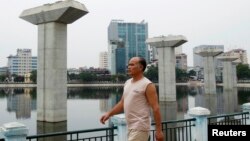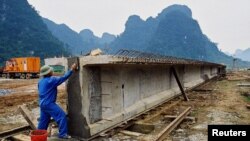HO CHI MINH CITY, VIETNAM —
Here’s a new way for governments to offer public services: use other people’s money.
The concept of public-private partnerships (PPP) isn’t novel, but it is gaining new traction in Vietnam. The country recently announced it will build its first express highway through a PPP arrangement that draws on private investment by Bitexco, a large multi-industry corporation.
Doing so will lessen the dent on public funds at a time when Vietnam is increasingly worried about its growing budget deficit.
It also will be a test of the communist country’s resolve to move away from bulky state-owned enterprises that are seen as one of the main drags on the lackluster economy. Analysts say cooperation with the private sector will bring greater expertise and the efficiencies of the market to infrastructure projects.
“The city leadership are really, really wanting to, and determined to, push the projects forward,” said a Ho Chi Minh City official who declined to be named. His department is not involved with the $750 million highway project, which will connect a neighboring province along the National Highway 1 with the resort town of Phan Thiet. But he said the city has submitted PPP deals for national approval and recognizes it is “high time” for such partnerships.
The timing matters. Growing interest in PPPs here is directly tied to Vietnam’s growing wealth. First, it reached middle-income country status in 2010, which makes it harder to attract official development assistance (ODA) from international donors and lenders. Second, its rapid urbanization and industrialization are creating demands on infrastructure that the government cannot meet alone.
“Vietnam is an emerging economy that has a great demand on infrastructure development, including airports, seaports and highways,” Bitexco deputy general director Nguyen Tien Dzung told Bloomberg Television.
Looking for international financing
His company has a 60 percent stake in the new expressway, with backing from the government and the World Bank. The hope is that private investors abroad will finance the remaining 40 percent.
It is unclear how the project would turn a profit, but private stakeholders presumably will reap returns by installing a toll system on the four-lane road.
Government policymakers will also have to convince investors that they have a sturdy framework to handle PPPs. They made a push to facilitate these partnerships in 2010, though progress has been slow. PPP divisions are being created at several levels, from the Ministry of Planning and Investment to its equivalent within the Ho Chi Minh City government.
The city official who spoke with VOA said he and his colleagues want to offer a “one-stop shop” for PPP deals. They’ve already worked on roughly 25 other projects that involve alternative financing, such as through the build-operate-transfer (BOT) model. For PPPs, they are tasked with outlining a procedure that’s transparent, fair, competitive and reliable.
“The private sector views [the] PPP bidding and negotiation processes as unpredictable and lengthy,” said Vinh Pham, a former government liaison for the local European Chamber of Commerce.
The new highway has reportedly attracted interest from 100 foreign investors. If successful, it would open the way for similar arrangements to improve water, power, and public transit infrastructure.
Gears in motion
Some already have set the gears in motion. The Japan Bank for International Cooperation, for instance, has signed a memorandum of understanding to develop projects via PPP with Hanoi and Ho Chi Minh City.
But so far, most investors seem to have taken a wait-and-see approach. Not just anyone can tackle as ambitious a contract as constructing an expressway. “Bitexco is perhaps one of the few companies that would have enough power and relationship with the government to take over the project,” said Pham Ngoc Bich of Saigon Securities.
Bitexco started off as a textile company but has ballooned into a powerhouse that invests in everything from mineral water to real estate, including the most iconic skyscraper anchoring the Ho Chi Minh City skyline.
It’s exactly this kind of investment Vietnam is seeking as it grapples with deficits in public funds. As of midyear, spending exceeded revenue by 62.1 trillion dong ($2.9 billion), according to the Ministry of Finance, compared with 50.7 trillion dong in the first quarter.
In the mixed bag of solutions, there’s been talk of raising the public debt ceiling and of issuing bonds worth at least 90 trillion dong this year. And now there’s both talk and action on public-private partnerships.
The concept of public-private partnerships (PPP) isn’t novel, but it is gaining new traction in Vietnam. The country recently announced it will build its first express highway through a PPP arrangement that draws on private investment by Bitexco, a large multi-industry corporation.
Doing so will lessen the dent on public funds at a time when Vietnam is increasingly worried about its growing budget deficit.
It also will be a test of the communist country’s resolve to move away from bulky state-owned enterprises that are seen as one of the main drags on the lackluster economy. Analysts say cooperation with the private sector will bring greater expertise and the efficiencies of the market to infrastructure projects.
“The city leadership are really, really wanting to, and determined to, push the projects forward,” said a Ho Chi Minh City official who declined to be named. His department is not involved with the $750 million highway project, which will connect a neighboring province along the National Highway 1 with the resort town of Phan Thiet. But he said the city has submitted PPP deals for national approval and recognizes it is “high time” for such partnerships.
The timing matters. Growing interest in PPPs here is directly tied to Vietnam’s growing wealth. First, it reached middle-income country status in 2010, which makes it harder to attract official development assistance (ODA) from international donors and lenders. Second, its rapid urbanization and industrialization are creating demands on infrastructure that the government cannot meet alone.
“Vietnam is an emerging economy that has a great demand on infrastructure development, including airports, seaports and highways,” Bitexco deputy general director Nguyen Tien Dzung told Bloomberg Television.
Looking for international financing
His company has a 60 percent stake in the new expressway, with backing from the government and the World Bank. The hope is that private investors abroad will finance the remaining 40 percent.
It is unclear how the project would turn a profit, but private stakeholders presumably will reap returns by installing a toll system on the four-lane road.
Government policymakers will also have to convince investors that they have a sturdy framework to handle PPPs. They made a push to facilitate these partnerships in 2010, though progress has been slow. PPP divisions are being created at several levels, from the Ministry of Planning and Investment to its equivalent within the Ho Chi Minh City government.
The city official who spoke with VOA said he and his colleagues want to offer a “one-stop shop” for PPP deals. They’ve already worked on roughly 25 other projects that involve alternative financing, such as through the build-operate-transfer (BOT) model. For PPPs, they are tasked with outlining a procedure that’s transparent, fair, competitive and reliable.
“The private sector views [the] PPP bidding and negotiation processes as unpredictable and lengthy,” said Vinh Pham, a former government liaison for the local European Chamber of Commerce.
The new highway has reportedly attracted interest from 100 foreign investors. If successful, it would open the way for similar arrangements to improve water, power, and public transit infrastructure.
Gears in motion
Some already have set the gears in motion. The Japan Bank for International Cooperation, for instance, has signed a memorandum of understanding to develop projects via PPP with Hanoi and Ho Chi Minh City.
But so far, most investors seem to have taken a wait-and-see approach. Not just anyone can tackle as ambitious a contract as constructing an expressway. “Bitexco is perhaps one of the few companies that would have enough power and relationship with the government to take over the project,” said Pham Ngoc Bich of Saigon Securities.
Bitexco started off as a textile company but has ballooned into a powerhouse that invests in everything from mineral water to real estate, including the most iconic skyscraper anchoring the Ho Chi Minh City skyline.
It’s exactly this kind of investment Vietnam is seeking as it grapples with deficits in public funds. As of midyear, spending exceeded revenue by 62.1 trillion dong ($2.9 billion), according to the Ministry of Finance, compared with 50.7 trillion dong in the first quarter.
In the mixed bag of solutions, there’s been talk of raising the public debt ceiling and of issuing bonds worth at least 90 trillion dong this year. And now there’s both talk and action on public-private partnerships.





